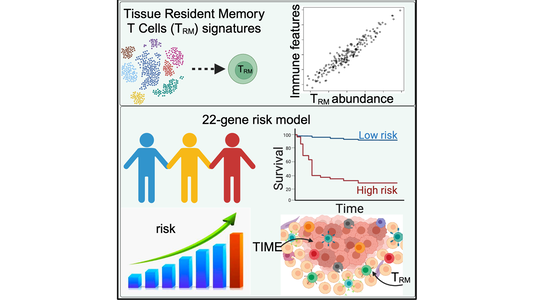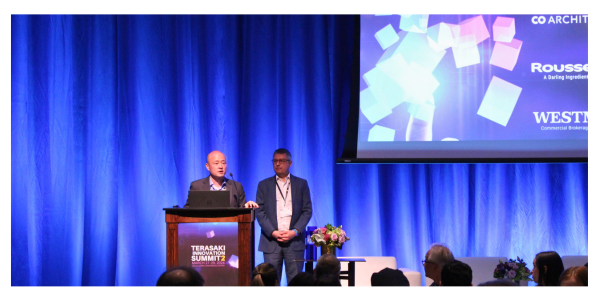DR. CHONGMING JIANG'S LABORATORY
ABOUT DR. CHONGMING JIANG
Dr. Chongming Jiang is an Assistant Professor at the Terasaki Institute. He received his Ph.D. degree from Sun Yat-sen University, and he was a postdoctoral researcher at Weill Cornell Medicine and Baylor College of Medicine, respectively. Dr. Jiang is interested in AI-empowered immunomics, which combining immunomics, AI machine learning, and biomedicine to address unresolved scientific issues in cancer immunotherapy and organ transplantation. He developed a series of prediction models, AI machine learning frameworks, and databases to investigate the immune infiltration of the microenvironment, improve cancer vaccine and T cell-based cancer immunotherapy, predict new candidate targets, and develop prognostic signatures in cancer and organ transplantation.
RESEARCH HIGHLIGHTS
RESEARCH OVERVIEW
Dr. Chongming Jiang’s Lab interested in combining immunomics, AI machine learning, and experimental biology to address unresolved scientific issues in cancer immunotherapy and organ transplantation.
Research areas:
(1) Immunomics (Genomics & Immunology)
(2) AI machine learning
(3) Precision Medicine (Cancer, Organ transplantation)
(4) Prognosis and drug response prediction
Immunomics (Genomics & Immunology)
Dr. Jiang’s lab proposes multiple approaches to predict the abundance of a particular class of immune cells and their role in the immune microenvironment based on the genomics data. Dr. Jiang’s lab developed multiple AI machine learning models to investigate the effect of tissue resident memory T cells, tumor associate macrophages, tumor infiltration NK cells, microglia, and B cells in the tumor microenvironment and predict the prognosis of multiple cancer types and the sensitivity of tumor patients to immunotherapy.
AI machine learning
Dr. Jiang’s lab has devised several innovative AI machine learning algorithmic frameworks to evaluate the feasibility of delivering mutant antigen targets into tumor cells. Through these frameworks, we elucidated that T cell-mediated immune surveillance profoundly shapes the mutational landscape of tumors, offering comprehensive biological explanations for observed phenomena. Furthermore, Dr. Jiang’s lab has curated multiple databases encompassing T cell antigenic epitopes and cancer vaccines. Leveraging in-depth analysis and machine learning techniques, these databases facilitate enhanced design of clinical trials for cancer vaccines. Additionally, Dr. Jiang’s lab introduced the AI machine learning algorithms to rapid screening of new antigens at significantly reduced time costs compared to previous methods. Dr. Jiang’s lab contributions extend beyond theoretical advancements, as Dr. Jiang’s lab holds two patents for tumor-specific antigens we identified, with patent publication numbers WO2018058490A1 (China) and US2019224291A1 (USA), respectively.
Precision Medicine(Cancer, Organ transplantation)
Dr. Jiang’s lab research involved identifying key genes and regulatory pathways associated with telomerase changes in progeria patients through multi-omics analysis and experimental validation. Treatment with mTERT lentivirus improved symptoms and prolonged the lifespan of progeria mice. To address the challenges of drug development, Dr. Jiang’s lab utilized patient-derived models for personalized medicine. Using the unique organoid model, MicroOrganoSpheres (MOS). Dr. Jiang’s lab confirmed its reliability in assessing tumor drug response and guiding treatment decisions for colorectal cancer. Dr. Jiang’s lab study highlighted the potential of the MOS model for precision oncology. Dr. Jiang’s lab investigated the regulatory mechanism of the key genes in tumor progression and immune signaling regulation, such as the PHF20 in gliomas and Beclin 2 in inflammation and lymphoma.
Dr. Jiang’s lab combines organ transplantation patients’ clinical data, genomics data, and AI machine learning to predict the immune rejection and long-term outcomes. Dr. Jiang’s lab research contributes to understanding disease mechanisms, identifying therapeutic targets, and improving personalized medicine approaches.
Prognosis and drug response prediction
Dr. Jiang’s lab integrates the immunomics and AI machine learning to identify genetic characterization and screening of molecular biomarkers to predict prognosis and drug response to therapy in cancer patients.
Join Our Mission
We aim to combine immunomics, AI machine learning, and biology to investigate the immune infiltration of the microenvironment, improve cancer vaccine and T cell-based cancer immunotherapy, predict new candidate targets, and develop prognostic signatures in cancer and organ transplantation.
CONTACT US
For more information about our research, to discuss potential collaborations, or to inquire about joining our team, please reach out to us at chongming.jiang@terasaki.org
PUBLICATIONS
1. Chao, C., Chiu, Y., Yeung, L., Yee, C., Jiang, C., and Shen, X. (2025). AI/ML-empowered approaches for predicting T Cell-mediated immunity and beyond. Front Immunol 16. https://doi.org/10.3389/fimmu.2025.1651533
2. Jiang, C., Chiu, Y., Yee, C., Chao, C., and Shen, X. (2025). Machine learning–driven approaches for predicting T-cell–mediated immunity and beyond. Journal of Clinical Oncology 43, 2588–2588. https://doi.org/10.1200/JCO.2025.43.16_suppl.2588
3. Kawakita, S., Shen, A., Wang, Z., Cheng, S., Li, B., and Jiang, C. (2024). 834 MHCepitopes: a comprehensive database of experimentally alidated MHC-restricted epitopes for antigen-specific cancer immunotherapy. In Regular and Young Investigator Award Abstracts (BMJ Publishing Group Ltd), pp. A942–A942. https://doi.org/10.1136/jitc-2024-SITC2024.0834
4. Jiang, C., Chiu, Y., Shen, X., and Chao, C. (2025). Abstract LB189: Prospective AI/ML-driven computational approaches for predicting T cell-mediated immunity and beyond. Cancer Res 85, LB189–LB189. https://doi.org/10.1158/1538-7445.AM2025-LB189
5. Jiang, C., Kawakita, S., Jucaud, V., Wang, J., Elrefaei, M., Stegall, M., Schinstock, C., Jaramillo, A., Zhu, Y., Hacke, K., et al. (2025). Machine Learning-Based Risk Prediction of Allograft Rejection within One-Year Post-Transplant for Kidney Transplant Patients. American Journal of Transplantation 25, S67. https://doi.org/10.1016/j.ajt.2025.07.129
6. Wang, Z., Huang, W., Kawakita, S., Bustamante, F., Larios, R., Jiang, C., Lekovic, G.P., Everson, R.G., Liau, L.M., Lai, A., et al. (2024). TMOD-36. NANOGLIOS: A MINIATURIZED PATIENT AVATAR ENABLING RAPID AND HIGH-THROUGHPUT PHENOTYPIC SCREENING FOR GLIOMAS. Neuro Oncol 26, viii327–viii327. https://doi.org/10.1093/neuonc/noae165.1300
7. Adefioye, O., Han, Y., Yeung, L., Shen, A., Wang, J., Wang, Z., Chao, C., and Jiang, C. (2025). Abstract 7349: Impact of HLA loss on NK cell infiltration and resistance to immunotherapy. Cancer Res 85, 7349–7349. https://doi.org/10.1158/1538-7445.AM2025-7349
8. Shen, A., Garrett, A., Chao, C., Liu, D., Zhu, Y., Mai, J., and Jiang, C. (2024). A comprehensive meta-analysis of tissue resident memory T cell shaping non-small-cell lung cancer immune microenvironment and patient prognosis. Journal of Clinical Oncology 42, 210–210. https://doi.org/10.1200/JCO.2024.42.23_suppl.210
9. Shen, A., Garrett, A., Chao, C.C., Liu, D., Cheng, C., Wang, Z., Qian, C., Zhu, Y., Mai, J., and Jiang, C. (2024). A comprehensive meta-analysis of tissue resident memory T cells and their roles in shaping immune microenvironment and patient prognosis in non-small cell lung cancer. Front Immunol 15, 1–13. https://doi.org/10.3389/fimmu.2024.1416751
10. Kawakita, S., Jucaud, V., Wang, Z., Shen, X., and Jiang, C. (2024). V-211.2: Computational immuno-profiling and prediction of antibody-mediated rejection in kidney transplant recipients. Transplantation 108. https://doi.org/10.1097/01.tp.0001066768.54156.a7
11. Shen, A., Chao, C., Garrett, A., Liu, D., Zhu, Y., Mai, J., and Jiang, C. (2024). 180 Tissue-resident memory T cell abundance shaping non-small-cell lung cancer immune microenvironment and patient prognosis. In Regular and Young Investigator Award Abstracts (BMJ Publishing Group Ltd), pp. A207–A207. https://doi.org/10.1136/jitc-2024-SITC2024.0180
12. Chen, Z., Zhang, B., Guo, H., Emani, P., Clancy, T., Jiang, C., Gerstein, M., Ning, X., Cheng, C., and Min, M.R. (2023). Binding peptide generation for MHC Class I proteins with deep reinforcement learning. Bioinformatics 39. https://doi.org/10.1093/bioinformatics/btad055
13. Jiang, C., Chao, C.-C., Li, J., Ge, X., Shen, A., Jucaud, V., Cheng, C., and Shen, X. (2024). Tissue-resident memory T cell signatures from single-cell analysis associated with better melanoma prognosis. iScience 27, 109277. https://doi.org/10.1016/j.isci.2024.109277
14. Xiang, K., Wang, E., Mantyh, J., Rupprecht, G., Negrete, M., Sanati, G., Hsu, C., Randon, P., Dohlman, A., Kretzschmar, K., et al. (2024). Chromatin Remodeling in Patient‐Derived Colorectal Cancer Models. Advanced Science. https://doi.org/10.1002/advs.202303379
15. Cheng, C., Nguyen, T.T., Tang, M., Wang, X., Jiang, C., Liu, Y., Gorlov, I., Gorlova, O., Iafrate, J., Lanuti, M., et al. (2023). Immune Infiltration in Tumor and Adjacent Non-Neoplastic Regions Codetermines Patient Clinical Outcomes in Early-Stage Lung Cancer. J Thorac Oncol 18, 1184–1198. https://doi.org/10.1016/j.jtho.2023.04.022
16. Zhu, M., Deng, G., Tan, P., Xing, C., Guan, C., Jiang, C., Zhang, Y., Ning, B., Li, C., Yin, B., et al. (2020). Beclin 2 negatively regulates innate immune signaling and tumor development. Journal of Clinical Investigation 130, 5349–5369. https://doi.org/10.1172/JCI133283
17. Mojiri, A., Walter, B., Jiang, C., Matrone, G., Holgate, R., Qiu, Q., Chen, K., and Cooke, J. (2020). Telomerase Therapy Reverses Vascular Senescence in Hgps. Canadian Journal of Cardiology 36, S4. https://doi.org/10.1016/j.cjca.2020.07.021
18. Liang, Y., Yang, R., Guo, Y., Jiang, C., Liu, L., Wan, Y., and Shao, Y. (2019). Spatiotemporal dynamics of different growth-diffusion systems on a percolation lattice. Phys Rev E 99, 1–11. https://doi.org/10.1103/PhysRevE.99.042401
19. Chao, C., Yuan, F., Liu, G., Li, G., Li, B., Lu, L., Tian, Y., Li, D., Zhou, B., An, T., et al. (2017). Abstract LB-202: A novel neoepitope screening platform for generating effective and safe neoantigen-based vaccines and immunotherapeutics in a hepatocellular carcinoma model. Cancer Res 77, LB-202-LB-202. https://doi.org/10.1158/1538-7445.am2017-lb-202
20. Mojiri, A., Walther, B.K., Jiang, C., Matrone, G., Holgate, R., Xu, Q., Morales, E., Wang, G., Gu, J., Wang, R., et al. (2021). Abstract 11821: Telomerase therapy reverses vascular senescence and extends lifespan in progeria mice. Circulation 42, 4352–4369. https://doi.org/10.1093/eurheartj/ehab547
21. Yang, R., Shao, Y., and Jiang, C. (2022). Invasiveness of Cancer Populations in a Two-dimensional Percolation cluster: a Stochastic Mathematical Approach. Preprint, https://doi.org/10.1101/2022.03.12.484105
22. Liu, Y.H., Jiang, C.M., Guo, X.M., Tang, Y.L., and Hu, L. (2013). DNA condensation and size effects of DNA condensation agent. Front Phys (Beijing) 8, 467–471. https://doi.org/10.1007/s11467-013-0342-8
23. Schaafsma, E., Jiang, C., Nguyen, T., Zhu, K., and Cheng, C. (2022). Microglia-Based Gene Expression Signature Highly Associated with Prognosis in Low-Grade Glioma. Cancers (Basel) 14. https://doi.org/10.3390/cancers14194802
24. Zhao, Y., Dong, Y., Hong, W., Jiang, C., Yao, K., and Cheng, C. (2022). Computational modeling of chromatin accessibility identified important epigenomic regulators. BMC Genomics 23, 1–16. https://doi.org/10.1186/s12864-021-08234-5
25. Ma, Q., Long, W., Xing, C., Jiang, C., Su, J., Wang, H.Y., Liu, Q., and Wang, R. (2020). PHF20 Promotes Glioblastoma Cell Malignancies Through a WISP1/BGN-Dependent Pathway. Front Oncol 10, 573318. https://doi.org/10.3389/fonc.2020.573318
26. Jiang, C., Li, J., Zhang, W., Zhuang, Z., Liu, G., Hong, W., Li, B., Zhang, X., and Chao, C.C. (2022). Potential association factors for developing effective peptide-based cancer vaccines. Front Immunol 13, 1–18. https://doi.org/10.3389/fimmu.2022.931612
27. Mojiri, A., Walter, B., Jiang, C., Matrone, G., Holgate, R., Qiu, Q., Chen, K., and Cooke, J. (2020). TELOMERASE THERAPY REVERSES VASCULAR SENESCENCE IN HGPS. Canadian Journal of Cardiology 36, S4. https://doi.org/10.1016/j.cjca.2020.07.021
28. Jiang, C., Schaafsma, E., Zhao, Y., Nguyen, T., Zhu, K., and Cheng, C. (2022). Abstract LB528: A microglia associated gene signature predicts survival risk in glioma patients. Cancer Res 82, LB528–LB528. https://doi.org/10.1158/1538-7445.am2022-lb528
29. Yang, R., Jiang, C., and Shao, Y. (2022). Invasiveness of a Growth-Migration System in a Two-dimensional Percolation cluster: A Stochastic Mathematical Approach. Bull Math Biol 84, 1–20. https://doi.org/10.1007/s11538-022-01056-w
30. Schaafsma, E., Jiang, C., and Cheng, C. (2021). B cell infiltration is highly associated with prognosis and an immune-infiltrated tumor microenvironment in neuroblastoma. J Cancer Metastasis Treat 7, 1–17. https://doi.org/10.20517/2394-4722.2021.72
31. Bo Li, Geng Liu, QIU Si, Dongli Li, Chongming Jiang, LUO Shuntao, LIN Xiumei, AN Ting, Yong Hou, CHAO Chengchi, Zhen Cheng, Handong Li, N.Y. (2019). Col14A1-derived tumor antigen polypeptide and use thereof. 371.
32. Ding, S., Hsu, C., Wang, Z., Natesh, N.R., Millen, R., Negrete, M., Giroux, N., Rivera, G.O., Dohlman, A., Bose, S., et al. (2022). Patient-derived micro-organospheres enable clinical precision oncology. Cell Stem Cell 29, 905-917.e6. https://doi.org/10.1016/j.stem.2022.04.006
33. Mojiri, A., Walther, B.K., Jiang, C., Matrone, G., Holgate, R., Xu, Q., Morales, E., Wang, G., Gu, J., Wang, R., et al. (2021). Telomerase therapy reverses vascular senescence and extends lifespan in progeria mice. Eur Heart J 42, 4352–4369. https://doi.org/10.1093/eurheartj/ehab547
34. Liu, Y., Chen, Y., Jiang, C., Li, B., Tang, Y., Hu, L., and Deng, L. (2013). Depletion effect and biomembrane budding. J Biol Phys 39, 665–671. https://doi.org/10.1007/s10867-013-9325-9
35. Jiang, C., Chao, C., and Cheng, C. (2020). Abstract 6618: A database of potential T cell epitopes for cancer immunotherapy. Cancer Res 80, 6618–6618. https://doi.org/10.1158/1538-7445.AM2020-6618
36. Jiang, C., Liu, G., Zhang, W., Zhuang, Z., Li, W., Qiu, S., Chao, C., Li, B., and Cheng, C. (2021). Abstract LB051: The landscape of peptide vaccinein clinical trials for cancer. Cancer Res 81, LB051–LB051. https://doi.org/10.1158/1538-7445.AM2021-LB051
37. Jiang, C., Schaafsma, E., Hong, W., Zhao, Y., Zhu, K., Chao, C.C., and Cheng, C. (2022). Influence of T Cell-Mediated Immune Surveillance on Somatic Mutation Occurrences in Melanoma. Front Immunol 12, 1–12. https://doi.org/10.3389/fimmu.2021.703821
38. Jiang, C., Cui, C., Zhong, W., Li, G., Li, L., and Shao, Y. (2016). Tumor proliferation and diffusion on percolation clusters. J Biol Phys 42. https://doi.org/10.1007/s10867-016-9427-2
39. Liu, Y., Chen, Y., Jiang, C., Li, B., Tang, Y., Hu, L., and Deng, L. (2013). Depletion effect and biomembrane budding. J Biol Phys 39. https://doi.org/10.1007/s10867-013-9325-9
40. Jiang, C., Cui, C., Li, L., and Shao, Y. (2014). The anomalous diffusion of a tumor invading with different surrounding tissues. PLoS One 9, e109784. https://doi.org/10.1371/journal.pone.0109784
PATENTS
1. Bo Li, Geng Liu, QIU Si, Dongli Li, Chongming Jiang, et al. US patent publication number is 20190224291
(COL14A1-DERIVED TUMOR ANTIGEN POLYPEPTIDE AND USE THEREOF).
2. Yong Hou, .., Chongming Jiang, Naibo Yang. Chinese patent publication number: WO2018058490A1.


























.png)

